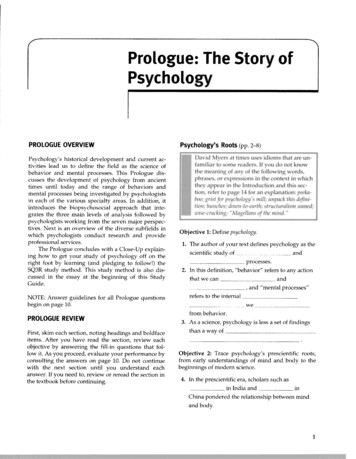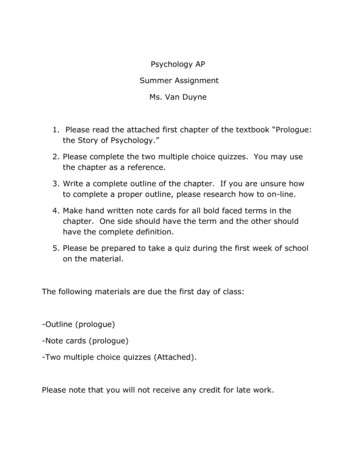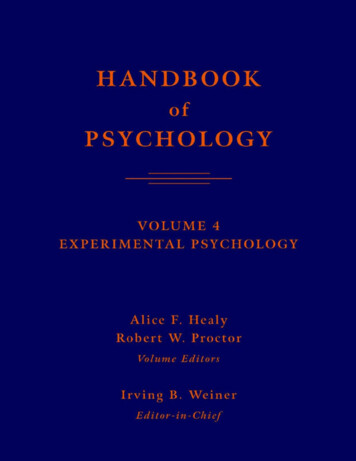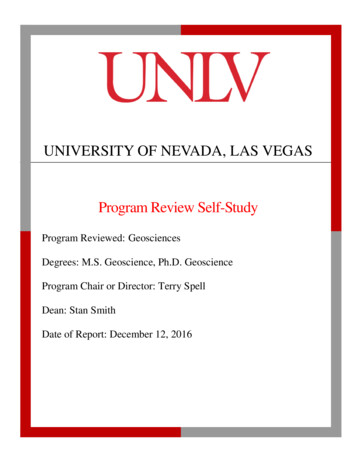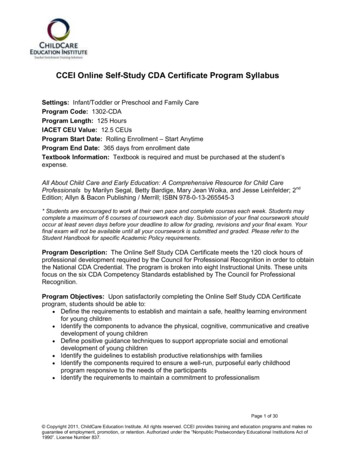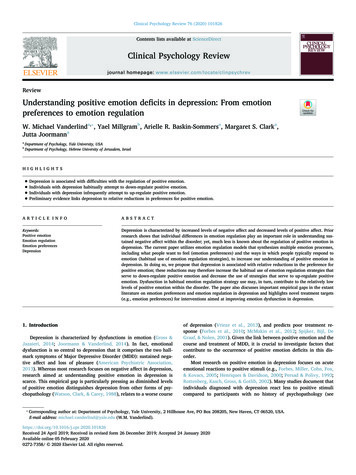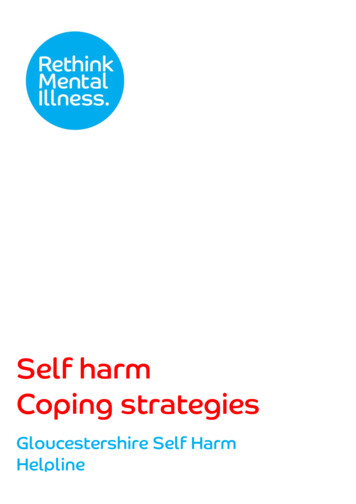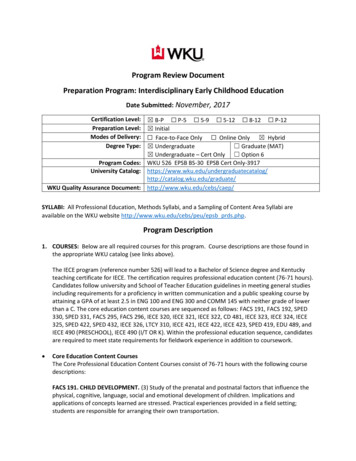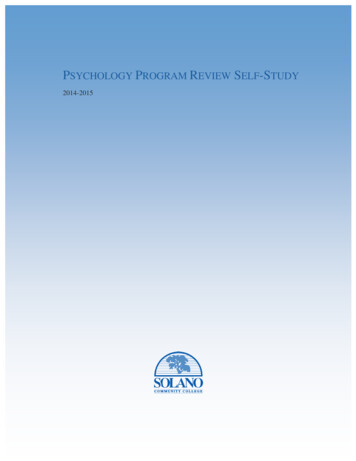
Transcription
PSYCHOLOGY PROGRAM REVIEW SELF-STUDY2014-20151Program Review Handbook & Self-Study Template
This page intentionally left blank
PSYCHOLOGY PROGRAM REVIEW SELF-STUDY FALL 20141.1 Introduction.There were five courses in Psychology offered at Solano Community College in 1971. Since thenfaculty have developed six additional courses and have 2 majors within the discipline. Many of the newcourses were a result of expanded directions for an AA Degree and, more recently, AA-T degree whichmost community colleges have instituted. In the early years, we had 3 full-time faculty while in the past7 years we have had 5 faculty members to meet the demands of both the Psychology and HumanServices programs.The Psychology program has maintained a high standard of teaching and rigorous course offeringsdespite several administrative reorganizations over the past several years. Psychology is currentlyhoused in the School of Social and Behavioral Sciences. Our discipline still remains as one of the top 4majors for graduation at SCC and nationwide. The introduction of several new courses including onlineofferings, collaboration with Human Services, implementation of Smart Classrooms and onlineresources has helped in our expansion, while the building of two additional campus sites has presented achallenge for our program. We have made efforts to offer a variety of courses at both centers; however,enrollment rates (primarily in Vallejo) continue to be problematic. Funding for technology, instructionalequipment and supplies, readers, faculty support and development has not kept up with student andfaculty needs.Providing and obtaining postsecondary education has become more challenging for students and faculty.We believe that this is due to changes in higher education, vacillations in the economy, desire to meetthe various needs of underserved and other populations (such as veterans and foster youth), changingworkforce needs and funding for education (including grants and financial aid). The results of our recentpsychology student survey confirm a need for our department to continue to offer a variety ofpsychology courses that are articulated for transfer, recommended or required for other majors, and forpersonal growth.The psychology program at Solano College offers eleven different courses on a regular basis (eachsemester or at least once a year) that are part of the academic major and Associate Degree in Psychologyand/or transfer requirements. Its emphasis is on providing rigorous academic instruction in basicpsychological concepts, theories, terminology, and research methods, and promoting life skills, personalgrowth, and interpersonal effectiveness.Solano students can complete an Associate Degree with a Major in Psychology in different waysdepending on their educational goal:Associate in Arts DegreeThe Associate in Arts Degree can be obtained by completing a total of 60 units, including the 18-unitmajor, general education requirements and electives.The Associate in Arts in Psychology for Transfer degree (ADT/AA-T) is designed especially forstudents who plan to complete a bachelor’s degree in Psychology at a CSU campus (guaranteedadmission to the CSU system). This degree also prepares students for psychology degree programs atother four-year institutions (without guarantees).1Program Review Handbook & Self-Study Template
Program OutcomesStudents who complete an Associate Degree for Transfer will be able to:1. Demonstrate an understanding of psychology as a science, in regard to major theories, methods andapplications.2. Successfully complete the required psychology (major) programCourses (each 3 units)PSYC 001Introduction to PsychologyPSYC 002Biological PsychologyPSYC 004Research Methods in Behavioral SciencePSYC 005Abnormal PsychologyPSYC 006Developmental PsychologyPSYC 007Cross-Cultural PsychologyPSYC 010Psychology of WomenPSYC 020Personal and Social BehaviorPSYC 030Introduction to Social PsychologyPSYC 034Human Sexual BehaviorPSYC 040Drugs, Society & BehaviorPSYC 049Psychology Honors (1-3 units)Psychology FacultyFull-TimeBolz, Sabine, Dipl.-Psych., LMFTCarl von Ossietzky Universitaet Oldenburg: Graduate Degree Clinical PsychologyUniversity Giessen, Germany: Undergraduate Degree PsychologyLicensure Clinical Psychologist/ PsychotherapyLicensure Marriage and Family Therapist (MFT)General Psychology; Gender and Sexuality Studies; Clinical/Abnormal Psychology; Social Work andHuman ServicesCabrera, Saki, PhDAt Solano Community College, Dr. Saki Cabrera serves students and the community as a full-timeprofessor in the departments of Psychology and Human Services. She also coordinates the HumanServices program at SCC and works as CEO of SC Associates: Strengthening Communities, anevaluation and applied social psychology consulting firm. Dr. Cabrera is a first generation bi-culturaland bi-lingual Puerto Rican who grew up in Bronx, New York. After graduating summa cum laude atIona College with a bachelor of arts, with a double major in psychology and humanisticcommunications, she completed her M.A. and doctoral degree at Claremont Graduate University inpsychology with an emphasis on applied social psychology and evaluation. Saki decided to give back totraditionally underrepresented populations by offering ways of connecting different views together—always blending theory with practice. She is a NIH and Kellogg scholar, is published, has successfullyled various federally funded, international and local research projects, and has developed, implementedand evaluated community programs focused on diverse aspects related to health, education, andvocation. She serves on several boards, directs an after school tutoring program, mentors communitymembers, and couldn’t imagine life without familia!2Program Review Handbook & Self-Study Template
DaPrato, Robert, MAM.A. Degree, San Francisco State University, June 1971Major: PsychologyB.A. Degree, San Francisco State University, January 1970Majors (dual): Sociology and PsychologyPost Graduate Education:Social Psychology, Environmental Psychology, Human Sexuality Personal and Social Behavior,GerontologyGotch, Mary, MAM.A. Degree, San Francisco State UniversityB.A. Psychology, Michigan State UniversityBiological Psychology, Research Methods, Drugs and Behavior, PsychopathologyJaimez, LaNae, PhDPhD, University of Texas at AustinB.S. Psychology, University of OklahomaCalifornia Licensed Psychologist (PSY16481)Biological Psychology, Research Methods, Developmental Psychology, Adolescent FemaleDevelopment, Social Psychology, Psychopathology, Substance Use Disorders and TreatmentAdjunct FacultyLindsay, Andriea, MAM.A., Social Science, California State University, ChicoM.A., Psychology, California State University, ChicoB.A., Sociology, California State University, ChicoBorn, raised and educated in California, Andriea has spent two years as a social worker and 8 years asan instructor in psychology. She is an avid world traveler and incorporates this into her classroom.Procsal, Amanda, MSB.A., Psychology, California State University, SacramentoM.S., Psychology, Northern Arizona UniversityIntroduction to Psychology and Research MethodsClassified StaffThe Psychology Department has experienced an inordinate turn-over in leadership over the past twentyyears. Within the past seven years there have been six (6) different Deans assigned to Psychology, andwe are currently in search for the seventh Dean. Similarly, due to repeated re-organizations of divisionson campus, Psychology has been housed within the different divisions/schools of Social Sciences, Fine& Applied Arts/Behavioral Sciences, Sciences and Mathematics and Social & Behavioral Sciences. Atpresent, Psychology is part of the School of Social & Behavioral Sciences with a temporary Dean, andone fulltime Administrative Assistant. The trend in turnover has also occurred with AdministrativeAssistants. The psychology department has not had consistent leadership and support at theadministrative level.3Program Review Handbook & Self-Study Template
1.2 Relationship to College Mission and Strategic Goals.“Solano Community College educates an ethnically and academically diverse studentpopulation drawn from our local communities and beyond. We are committed to help ourstudents to achieve their educational, professional and personal goals centered on thoughtfulcurricula in basic skills education, workforce development and training, and transfer leveleducation. The College accomplishes this three-fold mission through its dedicated teaching,innovative programs, broad curricula, and services that are responsive to the complex needs of allstudents.”The Psychology department’s mission closely aligns with that of the college. We educate anethnically and academically diverse population of students drawn from local communities andbeyond. Our diverse, experienced and knowledgeable faculty are committed to helping studentsachieve their educational, professional, and personal goals via a rigorous curriculum. The programprovides workforce development and transfer-level education. Faculty are committed to aligningSCC’s psychology curriculum with the American Psychological Association’s guidelines andstandards. Psychology faculty strive to fulfill the College’s three fold mission through dedicatedteaching, innovative courses, broad and contemporary curriculum and applied opportunities.http://www.solano.edu/about scc/mission.php4Program Review Handbook & Self-Study Template
Table 1. SCC’s Strategic Directions and GoalsGoal 1: FosterExcellence inLearningObj. 1.1Create an environmentthat is conducive tostudent learning.Obj. 1.2Create an environmentthat supports qualityteaching.Obj. 1.3 Optimizestudent performanceon Institutional CoreCompetencies5Program EvidencePsychology faculty strive to create a safe, structured environment thatis conducive to learning by clearly defining expectations forclassroom behavior and course success in their syllabi. Students areencouraged to actively engage in the educational process with respectfor others and the learning environment. Faculty interact with studentsregularly, often learning the names of their students (even in classeswith 50 students). Office hours are held as scheduled and students areencouraged or required to attend. Faculty use a variety of technologyin the classroom including PowerPoint, iClickers and embeddedvideos as a means to engage the diverse student population we serve.In addition, faculty make course resources available via MySolanoand Canvas. Comments from the students include, “The supplementalonline material really helps boost your grade.” “Committed professorswith the love for the field and the drive to teach.” “Knowledgeableand passionate teachers.”Psychology faculty are committed to quality teaching and take pridein offering academically rigorous courses. We strive to stay abreast ofthe latest best practices for undergraduate education in psychology asprescribed by the American Psychological Association. Faculty attenda variety of professional meetings (APA, Western PsychologyAssociation, California Psychological Association) andconferences/trainings allowing them to keep current on issues inpsychology. In addition, they are members of various professionalgroups such as The American Psychological Association, Society forthe Teaching of Psychology and American Psychological Society.Psychology faculty meet regularly to exchange ideas.The psychology course SLOs map onto the Institutional CoreCompetencies (ILOs) in one or more areas. SLOs for each course areassessed on a regular basis and psychology faculty use thisinformation to modify their teaching approach and courses tomaximize student performance on SLOs and ILOs. ILO #2-CriticalThinking and Information Competency are addressed in allpsychology classes and culminates in the Research Methods course(PSYC 004). ILO #4- Personal Responsibility and ProfessionalDevelopment are addressed in all Psychology classes with specificemphasis in Personal and Social Behavior (PSYC 20), Human SexualBehavior (PSYC 34) and Drugs, Society and Behavior (PSYC 40).Program Review Handbook & Self-Study Template
Goal 2:MaximizeStudentAccess &SuccessProgram EvidencePsychology faculty provide information regarding support services(Counseling, DSP, Tutoring Center, Writing lab, Academic SuccessCenter, Student Success Workshops, Financial Aid, cohort programs,etc.) to students via syllabi, postings in the classrooms, email andObj. 2.1verbally. Students are referred to support services as appropriate on anIdentify and provideongoing basis. In addition, faculty provide tutoring in the Academicappropriate support forSuccess center. Study skills are taught as a part of some of theunderprepared studentspsychology courses. Recently, an instructional assistant is available towork with PSYC 1 students. Three of the psychology courses haveprerequisites to help ensure that students are prepared for subsequentcourses.6Obj. 2.2Update and strengthencareer/technicalcurriculaFor psychology majors with a CTE career goal we offervocational/academic course via the Human Services Program.Obj. 2.3Identify and provideappropriate support fortransfer studentsThe psychology program offers an ADT/AA-T in psychology. Allpsychology courses that are eligible for CI-D approval have beenapproved indicating that they meet criteria for the California TransferModel Curriculum. Psychology faculty write letters ofrecommendation for students wishing to transfer to four yearinstitutions on a regular basis. Psychology courses taught at SolanoCollege are designed to prepare students for success in upper divisionpsychology courses. Faculty regularly hear back from students whohave transferred to four-year institutions about how their psychologyeducation at Solano has benefited them as they further their educationand training. Faculty continually consult with students and provideguidance as to what is needed to transfer, information aboutsucceeding after transfer and career opportunities.Program Review Handbook & Self-Study Template
7Obj. 2.4Improve studentaccess to collegefacilities and servicesto studentsThe psychology faculty ensure that every psychology course isoffered at least once a year. Furthermore, efforts are made to offer avariety of courses at the two centers and in the evening. Faculty alsohold office hours at the centers (when teaching there) and in the earlyevening or by appointment for evening students; online office hoursare also available for all students. Announcements regarding servicesand opportunities are shared with students via email and in class.Faculty have noted that due to limited hours, student services, tutoringand study space is more difficult for students to access in the eveningand summer session.Obj. 2.5Develop andimplement an effectiveEnrollmentManagement PlanThe psychology class schedule is designed for students to completecourses required for a degree in psychology in a timely manner.Faculty work to recognize trends in enrollment in psychology coursesand respond accordingly. For example, due to the high demand forPSYC 004 – Research Methods a second course section was offeredevery semester until more recently when enrollments dropped due to anewly implemented Math – 11 prerequisite. A second example, PSYC34 – Human Sexual Behavior is a very popular course and additionalsections were added to meet this need. PSYC 6 –DevelopmentalPsychology is a prerequisite for a variety of graduate programs (e.g.,Physical Therapy, Genetic Counselor) and was developed specificallyto meet this need.Program Review Handbook & Self-Study Template
Goal 3:StrengthenCommunityConnectionsObj. 3.1Respond to community needsStudents from the community sometimes seek out specificpsychology courses as they retrain to pursue a new career. Theimplementation of PSYC – 6 Developmental Psychology fills arequirement for many students who already obtained a bachelor’sdegree, as does PSYC 5 Abnormal Psychology. Furthermore, manyhuman services providers encourage their employees to seekadditional education/training, and many psychology courses canfulfill this need. Psychology faculty strive to help all studentsincrease understanding of diversity, personal growth, selfmanagement and self-awareness.Obj. 3.2Expand ties to thecommunityThe psychology program has developed ties to the community viavolunteer work/activities of our faculty and students. Facultymembers facilitate tutoring programs in the community, serve onBoards, work with nonprofit organizations and guide PsychologyClub students in volunteer activities. In addition, faculty mentorand train members of the community. A psychology facultymember is co-chair of the High-School Outreach committee atSCC. The Psychology Program students have volunteered incommunity activities such as tutoring, collecting toiletries for thehomeless and various fundraising walks.Goal 4: OptimizeResourcesObj. 4.1Develop and manageresources to supportinstitutional effectivenessObj. 4.2Maximize organizationefficiency and effectiveness8Program EvidenceProgram EvidenceThe Psychology Department has never been presented with abudget. We have unsuccessfully attempted to procure funds via thestrategic planning process and other grants. The psychologydepartment will continue to pursue funding from various resources.The Psychology Department works in a diligent and ethical mannerto provide rigorous courses that meet the needs of the students inan efficient way. Faculty meet regularly to address these goals.Program Review Handbook & Self-Study Template
Obj. 4.3Maintain up-to-datetechnology to support thecurriculum and businessfunctions.Psychology faculty utilize Clickers, On-line delivery methods,Canvas, electronic materials, PowerPoints, ancillary onlineresources, hyperlinks, MySolano, various course managementsystems and video in their courses.1.3 Enrollment.Data in Table 1.3a reflects 2010-2011 academic year to present for scheduled sections, actual sectionsFTES and declared psychology reeSeekersheadcount106.2467416184422110.2208 474NA170Enrollment data in psychology is strong but has declined in recent years. The number of sectionsoffered (ranging between 24 and 27 sections per semester) has remained relatively constant whileFTES has declined in recent years. This is somewhat consistent with the College’s overall sectioncount and FTES which has declined slightly over the time period. Number of psychology majors(degree seekers) has remained relatively constant over the years. The decline in declaredpsychology majors is in proportion with the decline in overall enrollment at the college. Somefactors that have impacted the number of sections offered and FTES are:1. Economic factors: As the economy is improving after the recession, college enrollments havedeclined across the country and the state.2. Accreditation issues: Solano was on "Show Cause" and only recently (January 2014) has beenaccredited without sanctions. Concern and misunderstanding of Solano's accreditation status mighthave caused students to transfer to other colleges.3. Cancelled summer classes: Summer classes were cancelled in 2012. Students may have gone toother colleges and institutions at this time and continued their educations at those institutions.4. Expanded offerings at Centers led to an increase in some course offerings.Enrollments in psychology have shown a decline parallel to that of the college over the last year. Thepsychology faculty have been able to offer the same number of sections, but the fill rates have beenlower. However, the number of students seeking psychology degrees remains high. Despite a decline inthe number of psychology majors, psycholog
M.A., Psychology, California State University, Chico B.A., Sociology, California State University, Chico Born, raised and educated in California, Andriea has spent two years as a social worker and 8 years as an instructor in psychology. She is an avid world traveler and incorporates this into her classroom. Procsal, Amanda, MS B.A., Psychology .
